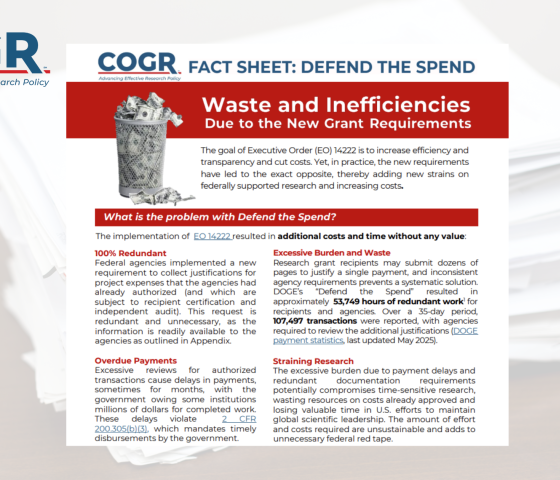Executive Order 14222, intended to enhance efficiency and transparency and reduce costs in federally funded research, has instead imposed significant new...
Other Post Award
Financial research accounting, management, and billing activities are subject to various and evolving requirements. COGR assesses and reports on significant changes, as well as advocating for practical requirements that provide effective safeguards without undue administrative burden.

Featured
Points to Consider for Reimbursement of Expenses Under Active Grants (V.2): Framework for Navigating the 2025 Administration Transition
Changes to federal payment systems, processes, and requirements implementing
Updated: Costing Points to Consider for Terminations and Suspensions (V.2)
Communications from federal agencies about terminations and suspensions are inconsistent with each other and often with sponsor policies and Uniform Guidance.&…
Resources
Point of Contact
All Other Post Award Articles
COGR Joins AAU and APLU Presidents in Submitting Joint Letter to Government Officials in Response to Unnecessary Disruptions to Federally Supported Research
The letter from the leaders of the AAU, APLU, and COGR expresses deep concern about recent disruptions to federally funded research resulting from executive actions and agency procedures, including interrupted payments, unclear directives relating to DEI compliance, abrupt project terminations, and a new NIH cap on facilities and administrative cost reimbursement. The authors urge federal official
Facilities & Administrative Costs of Research: One Pager
The document emphasizes the essential role of Facilities and Administrative (F&A) costs—also known as indirect costs—in supporting federally funded research in the United States. It outlines how F&A reimbursements enable research institutions to maintain necessary infrastructure, comply with regulations, and ensure the safe and effective conduct of innovative research, ultimately benefitin
Comparing Foundation and Federal Government Research Support
This document provides a comparative analysis of private foundation and federal government support for biomedical research, with a particular focus on the treatment of facilities and administrative (F&A) or indirect costs. While private foundations contribute only about 6 percent of overall U.S. academic research and development funding, in contrast to the federal government’s 55 percent, thei
COGR Responds to OMB's Invitation to Provide Comments and Technical Corrections to Address Select Items in the Recently Released OMB Guidance for Federal Financial Assistance (Fourth Look)
This comment letter offers detailed comments and proposed technical corrections to the OMB’s updated Uniform Grant Guidance for Federal Financial Assistance, set to take effect October 1, 2024. The letter highlights COGR's recommendations on timely implementation of new thresholds for equipment and subawards, urges reconsideration of changes regarding fixed amount awards, and advocates for the rea
Great Minds: Brainstorming & Benchmarking with COGR Member Institutions: June 2024
The document outlines the agenda and discussion themes for the "Great Minds: Brainstorming & Benchmarking" session held COGR on June 6, 2024. Moderated by key COGR directors and committee chairs from prominent research institutions, the session provides a collaborative platform for member institutions to discuss compliance, policy implementation, and operational challenges related to research
OMB Advance Questions: June 2024 Meeting
The document presents a series of detailed, advance questions directed at the Office of Management and Budget (OMB) concerning recent changes and updates to federal grant administration guidance, particularly with respect to cost principles, indirect costs, and award management. The queries reflect both constructive feedback and concerns from institutional stakeholders about the practical implicat
NIH Latest Updates—June 2024 Meeting
The document provides updates from the NIH Office of Policy for Extramural Research Administration, focusing on data management and sharing, grant closeout procedures, and research security/disclosure requirements. Key highlights include ongoing efforts to revise NIH Data Management and Sharing (DMS) Plan templates based on feedback from both researchers and program officials, with particular atte
COGR Joins AIRI in Submitting Comments to OMB on the Treatment of Salaries and the Executive Level II Salary Limitation
The Council on Governmental Relations (COGR) and the Association of Independent Research Institutes (AIRI), collectively representing over 300 research institutions, formally express concerns regarding a potential policy change that would extend the Executive Level II federal salary limitation to indirect salaries funded by institutions themselves. The organizations argue that, for the past 30 yea
COGR Responds to OMB's NPRM on Guidance for Grants & Agreements "Uniform Guidance"
The document is a formal response from the Council on Governmental Relations (COGR), representing over 200 U.S. research universities and affiliated institutions, to the Office of Management and Budget’s (OMB) proposed revisions to 2 CFR Chapters 1 and 2. COGR commends OMB for its transparency and dedication throughout the rulemaking process but highlights several areas where the proposed changes
Session Materials Available: Workshop on Compliance with Research Security Requirements and the Associated Cost of Compliance Survey
On September 27, 2023, COGR hosted a virtual, interactive workshop to provide an opportunity for members to share information on institutional efforts to comply with research security requirements and how to assess associated costs and institutional burden. The workshop was led by COGR directors and members of COGR’s four committees.



